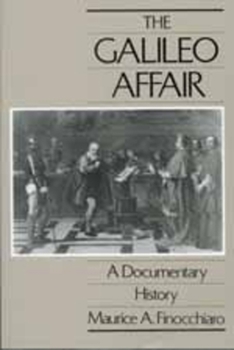The Galileo Affair: A Documentary History Volume 1
(Part of the California Studies in the History of Science Series)
Select Format
Select Condition 
Book Overview
In 1633 the Roman Inquisition concluded the trial of Galileo Galilei with a condemnation for heresy. The trial was itself the climax of a series of events which began two decades earlier (in 1613) and included another series of Inquisition proceedings in 1615-1616. Besides marking the end of the controversy that defines the original episode, the condemnation of 1633 also marks the beginning of another classic controversy-about the Galileo affair,...
Format:Paperback
Language:English
ISBN:0520066626
ISBN13:9780520066625
Release Date:May 1989
Publisher:University of California Press
Length:398 Pages
Weight:1.24 lbs.
Dimensions:1.0" x 6.0" x 9.0"
Customer Reviews
2 ratings
Reference only
Published by Thriftbooks.com User , 15 years ago
This book should not be called "a documentary history." It is true that it consists of documents (exclusively so, excepts for a very basic introduction) and that these are historical, but the professed conjunction does not obtain. The book prides itself in being non-interpretative, but the problem is that no more than a dozen pages are needed for an exhaustive, non-interpretative history of the Galileo affair. It becomes a 400-page book only by being extremely repetitive. Every single point is repeated at least three or four times: first in a letter or two, then in some treatise, then in Inquisition commission reports, then in witness testimonies before the Inquisition, then in the Inquisition's conclusion, etc. What this book is not may be illustrated with an example from the short introduction. Here we read that Pope Urban VIII, whose tolerance Galileo overestimated, may have been driven to make an example out of Galileo to mend his own reputation, especially in relation to critiques of his not being ardent enough in his support for the catholic side in the thirty years war. One may have hoped that pursuing letters and internal documents would reveal precisely this type of behind-the-scenes aspects of the affair. But unfortunately the letters are far more formulaic and no more revealing than the formal proceedings themselves. The final Inquisition report of about five pages is in effect a concise summary of the whole book; the rest is almost entirely redundant reiteration. The outline of the story, to which so very little depth is added, may be recounted as follows. The dispute seems to have been sparked not so much by heliocentrism as such but rather by Galileo's forays into scriptural interpretation. Galileo claims that in such matters "one must begin not with the authority of scriptural passages but with sensory experience and necessary demonstrations" (p. 93). This because "Scripture appear to be full not only of contradictions but also of serious heresies and blasphemies; for one would have to attribute to God feet, hands, eyes, and bodily sensations, as well as human feelings like anger contrition, and hatred, and such conditions as the forgetfulness of things past and the ignorance of future ones" (an argument which, by the way, we hear him repeat three times; pp. 50, 85, 92). The clash with the interpretations of the church fathers Galileo explains by the fact that heliocentrism was not an issue at that time (p. 108) and that such matters were considered unimportant. He quotes St. Augustine as saying that "God did not want to teach men these things which are of no use to salvation," and ask how, then, "one can now say that to hold this rather than that proposition on this topic is so important that one is a principle of faith and one is erroneous?" (p. 95). As for actual biblical interpretation, Galileo's most prominent example is that of Joshua stopping the sun to lengthen the day. Galileo criticises the geocentric interpretation by
Emphasis on "documentary"
Published by Thriftbooks.com User , 17 years ago
Not exactly what I was looking for. Aside from the 43-page introduction, this book is a primary source of documentation (letters to and from Galileo) surrounding Galileo and his two trials, and devoid of commentary or narrative.






